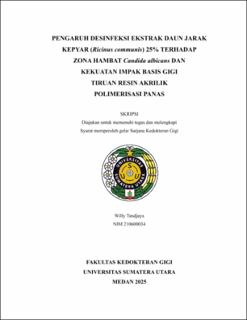| dc.contributor.advisor | Ritonga, Putri Welda Utami | |
| dc.contributor.author | Tandjaya, Willy | |
| dc.date.accessioned | 2025-04-08T04:03:09Z | |
| dc.date.available | 2025-04-08T04:03:09Z | |
| dc.date.issued | 2025 | |
| dc.identifier.uri | https://repositori.usu.ac.id/handle/123456789/102669 | |
| dc.description.abstract | The heat-polymerized acrylic resin denture base has biological properties that
can become a site for the growth of microorganisms such as Candida albicans, as well
as mechanical properties, one of which is impact strength. Denture disinfection can be
carried out using herbal disinfectants such as castor leaf extract (Ricinus communis).
Castor leaves contain chemical compounds that act as antifungal agents, including
alkaloids, flavonoids, triterpenoids, tannins, and phenolics, which can reduce the
impact strength of denture bases. This study aims to determine the effect of disinfection
with 25% castor leaf extract on the inhibition zone of Candida albicans and the impact
strength of heat-polymerized acrylic resin denture bases after 1 and 2 years of
simulation. This study uses an experimental laboratory design. The research method
involves disinfecting denture base samples with 25% castor leaf extract as the
treatment group, with 1 year and 2 year simulations. The results were analyzed using
univariate tests and T-tests. The average inhibition zone of Candida albicans in the
25% castor leaf extract group for the 1 year simulation was 11.61 ± 0.77 mm and for
the 2 year simulation was 12.05 ± 0.67 mm. The average impact strength in the 25%
castor leaf extract group for the 1 year simulation was 1284.53 ± 145.73 J/m² and for
the 2 year simulation was 1187.34 ± 295.60 J/m². The T-test results showed significance
for the 1 year simulation (p = 0.047) and the 2-year simulation (p = 0.001). This
indicates that there is an effect of 25% castor leaf extract disinfection on the inhibition
zone of Candida albicans in heat-polymerized acrylic resin denture bases. For impact
strength, the T-test results for the 1 year simulation (p = 0.449) and 2 year simulation
(p = 0.544) showed no significant effect. Therefore, the conclusion is that 25% castor
leaf extract has a strong effect on Candida albicans inhibition but does not affect the
impact strength of heat-polymerized acrylic resin denture bases after 1 and 2 years of
simulation | en_US |
| dc.language.iso | id | en_US |
| dc.publisher | Universitas Sumatera Utara | en_US |
| dc.subject | Denture base | en_US |
| dc.subject | Heat polymerized acrylic resin | en_US |
| dc.subject | inhibition zone | en_US |
| dc.subject | impact strength | en_US |
| dc.subject | castor leaf extract | en_US |
| dc.title | Pengaruh Desinfeksi Ekstrak Daun Jarak Kepyar (Ricinus communis) 25% Terhadap Zona Hambat Candida albicans dan Kekuatan Impak Basis Gigi Tiruan Resin Akrilik Polimerisasi Panas | en_US |
| dc.title.alternative | Effect Of 25% Castor Leaf (Ricinus communis) Extract Disinfection on Candida albicans Inhibition Zone And Impcat Strength Of Heat-Polymerized Acrylic Resin Denture Base | en_US |
| dc.type | Thesis | en_US |
| dc.identifier.nim | NIM210600034 | |
| dc.identifier.nidn | NIDN0018088702 | |
| dc.identifier.kodeprodi | KODEPRODI12201#Pendidikan Dokter Gigi | |
| dc.description.pages | 110 Pages | en_US |
| dc.description.type | Skripsi Sarjana | en_US |
| dc.subject.sdgs | SDGs 3. Good Health And Well Being | en_US |


